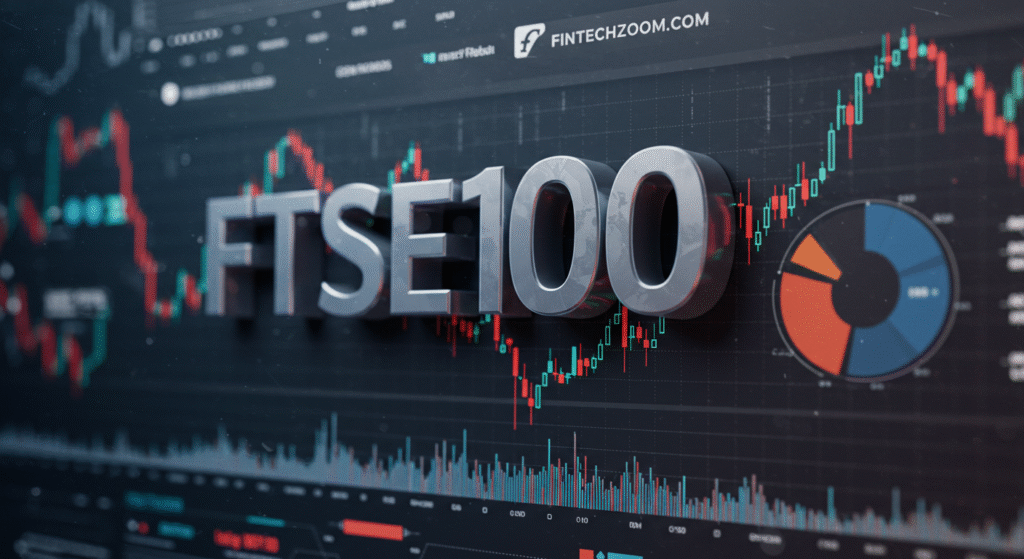The FTSE 100 index is a critical benchmark for the financial health and performance of the UK’s largest publicly traded companies. As tracked by Fintechzoom.com FTSE 100, it represents the market capitalization of the top 100 companies listed on the London Stock Exchange (LSE). These companies span across various sectors, including banking, energy, and consumer goods, providing a snapshot of the UK economy’s vitality. In this article, we will take a deep dive into the Fintechzoom.com FTSE 100, exploring its components, significance, and how it reflects broader market trends, providing valuable insights for investors, analysts, and anyone interested in the stock market.
What is the FTSE 100?
The FTSE 100, often referred to as the Footsie, is a stock market index that includes the 100 largest companies on the London Stock Exchange by market capitalization. These companies are primarily based in the UK, but many operate on a global scale, giving the FTSE 100 a strong international presence. The index is maintained by the FTSE Group, a subsidiary of the London Stock Exchange.

Key Features of the FTSE 100
- Market Capitalization Based: The FTSE 100 is weighted by market capitalization, which means that the larger the company’s market value, the more influence it has on the index.
- Sector Representation: The index includes a broad array of industries, such as banking (e.g., HSBC), energy (e.g., BP, Shell), pharmaceuticals (e.g., GlaxoSmithKline), and consumer goods (e.g., Unilever).
- Global Reach: Many of the companies listed in the FTSE 100 have international operations, making the index a good gauge of global market trends and economic conditions.
- Rebalancing: The index is regularly updated to reflect market shifts, with companies being added or removed based on their performance.
Also Read: ProSiteSite com: The Ultimate Resource for Website Professionals
The Importance of the FTSE 100 in Global Financial Markets
The FTSE 100 is one of the most widely followed stock market indices globally. Its significance extends beyond just the UK market, making it a critical tool for both domestic and international investors.
Indicator of UK Economic Health
The FTSE 100 serves as a barometer of the UK economy, reflecting the performance of some of the country’s largest corporations. Given that these companies often represent a significant portion of the UK’s GDP, changes in the FTSE 100 can signal economic growth or decline. For example, a rise in the index typically indicates economic expansion, while a decline may signal a contraction.
Investment Tool for Global Investors
Global investors use the FTSE 100 to gain exposure to the UK stock market. Since many of the companies listed in the index are multinational corporations, they offer a way for investors to gain indirect exposure to other global markets. This is particularly useful for investors looking to diversify their portfolios.
A Key Component for Financial Products
The FTSE 100 is also used as the basis for many financial products, including Exchange Traded Funds (ETFs) and mutual funds. These products allow investors to track the performance of the index without having to buy individual stocks. Additionally, derivatives such as futures and options are also based on the FTSE 100, providing investors with opportunities for hedging and speculation.
Major Companies in the FTSE 100
The FTSE 100 includes many of the UK’s most well-known and globally recognized companies. Among them are household names like HSBC, Shell, BP, and Unilever. Let’s take a closer look at some of the key players:
1. HSBC
One of the largest banking and financial services organizations in the world, HSBC plays a major role in the FTSE 100. The bank operates in over 60 countries and provides a wide range of services, from retail banking to corporate finance.
2. Shell
Royal Dutch Shell, or simply Shell, is one of the largest oil companies in the world. The company’s stock is a significant contributor to the FTSE 100 due to its massive market capitalization, making it an essential part of the energy sector in the index.
3. BP
Another major player in the energy sector, BP is a multinational oil and gas company. BP is a key component of the FTSE 100, and its performance is often closely linked to the fluctuations in oil prices.
4. Unilever
Unilever is a global consumer goods company known for brands like Dove, Lipton, and Ben & Jerry’s. Its diverse product portfolio spanning food, beverages, personal care, and home care makes it a standout company in the FTSE 100.
5. GlaxoSmithKline (GSK)
A leading global healthcare company, GlaxoSmithKline is involved in pharmaceuticals, vaccines, and consumer health products. GSK’s performance in the FTSE 100 is often influenced by developments in the healthcare sector.
6. AstraZeneca
AstraZeneca is another pharmaceutical giant in the FTSE 100, known for its contributions to global health, including the development of the COVID-19 vaccine. Its stock is crucial to the healthcare sector’s representation in the index.
Also Read: Coomersu: The Rise of Community-Centric Commerce
Understanding the Performance of the FTSE 100
The performance of the FTSE 100 is determined by the price movements of the constituent stocks. Market conditions, global events, and economic indicators all play a role in influencing the index.
1. Global Economic Factors
Global economic trends such as interest rates, inflation, and geopolitical stability have a significant impact on the FTSE 100. For example, a rise in interest rates by central banks may negatively affect the performance of stocks, leading to a drop in the FTSE 100.
2. Sector Performance
Since the FTSE 100 covers various sectors, the performance of each sector can affect the overall performance of the index. For instance, if the energy sector is performing well due to rising oil prices, companies like Shell and BP will likely see their stock prices rise, lifting the index.
3. Corporate Earnings
Corporate earnings reports are another important factor in the FTSE 100’s performance. Strong earnings reports from major companies like HSBC or Unilever can boost investor confidence, leading to an increase in stock prices and a rise in the index.
The Role of Fintechzoom.com in Tracking the FTSE 100
Fintechzoom.com is a key resource for tracking the FTSE 100, providing real-time data, analysis, and news on the index and its constituent companies. The platform offers users detailed insights into market movements, helping investors make informed decisions.
1. Real-Time Market Data
Fintechzoom.com provides real-time data on the FTSE 100, including current prices, market cap, and trading volume. This information is invaluable for traders and investors looking to track the index’s performance throughout the trading day.
2. News and Insights
The site also offers up-to-date news and insights on the FTSE 100 companies, as well as broader market trends. These insights help users understand the factors driving market movements, from corporate earnings reports to global economic events.
3. Analysis and Tools
Fintechzoom.com offers analysis tools that allow users to assess the performance of individual FTSE 100 stocks or the index as a whole. These tools are essential for making data-driven investment decisions.
How to Invest in the FTSE 100
Investors interested in the FTSE 100 have several options for gaining exposure to the index. The most common methods include:
1. ETFs and Index Funds
Exchange-Traded Funds (ETFs) and index funds that track the FTSE 100 provide a simple way for investors to gain exposure to the top 100 UK companies. These funds are passively managed and offer broad diversification within the index.
2. Stocks of Individual Companies
Investors can also choose to buy stocks from individual companies that make up the FTSE 100, such as HSBC, Shell, or Unilever. This method allows for more targeted investments, but it requires more research and understanding of individual companies.
3. Derivatives
For those seeking more advanced strategies, derivatives such as options and futures allow investors to speculate on the movement of the FTSE 100 without owning the underlying stocks.
Also read: Betechit.com Contacts: A Comprehensive Guide to Official Communication Channels
FAQs about Fintechzoom.com FTSE 100
What is the FTSE 100?
The FTSE 100 is a stock market index consisting of the top 100 companies listed on the London Stock Exchange by market capitalization.
How does the FTSE 100 affect the UK economy?
The FTSE 100 is a reflection of the performance of the UK’s largest companies, which are major contributors to the country’s GDP. Therefore, the index can provide insights into the health of the UK economy.
How can I invest in the FTSE 100?
Investors can invest in the FTSE 100 through ETFs, index funds, or by purchasing shares of individual companies listed in the index.
What sectors are represented in the FTSE 100?
The FTSE 100 includes companies from various sectors, including finance, energy, healthcare, consumer goods, and more.
Conclusion
The FTSE 100 serves as a vital indicator of the UK’s economic performance, offering insights into the health of some of the country’s largest and most influential companies. With resources like Fintechzoom.com, investors can stay up-to-date on the latest market movements, trends, and analyses, making it an essential tool for anyone interested in the UK stock market.

